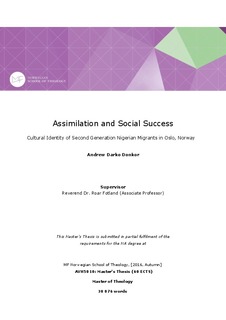| dc.description.abstract | A lot of scholarly work has been done on migration and its challenges in the past and today. In recent years, the migration crises resulting from large numbers of immigrants escaping war in the Middle East and heading towards Europe have brought issues of Migration into sharp focus. In Norway, most academic work on immigration has focused on the large immigrant population. In this work, I have focused on the assimilation of second generation Nigerian migrants living in Oslo, Norway of Pentecostal background and sought to determine whether they identify more with their Nigerian heritage or Norwegian culture, and the factors which have shaped this identity.
I used qualitative method of research in which I conducted several semi-structured interviews church leaders, parents and second generation young adults. Factors that were researched to determine the degree of assimilation of the youth were language, their opinions on interracial marriage, return - to - Nigeria considerations, the challenges they face and the perception of systematic discrimination, as well as their outlook on their future. It was found that while most of these indicators pointed towards a good degree of assimilation into Norwegian society, the second generation youths still displayed a very strong sense of a Nigerian identity rather than a Norwegian one, as well as the Christian Pentecostal values and traditions of their parents. This shows that it is possible for an immigrant population to be assimilated and very well integrated within a host community and appreciating that culture and its values, while at the same time, maintaining their distinct cultural and religious identity. While assimilation and integration are essential for social success, it do not, however, require that an individual loses all vestiges of his / her original identity while assuming the host identity in its entirety. | nb_NO |
